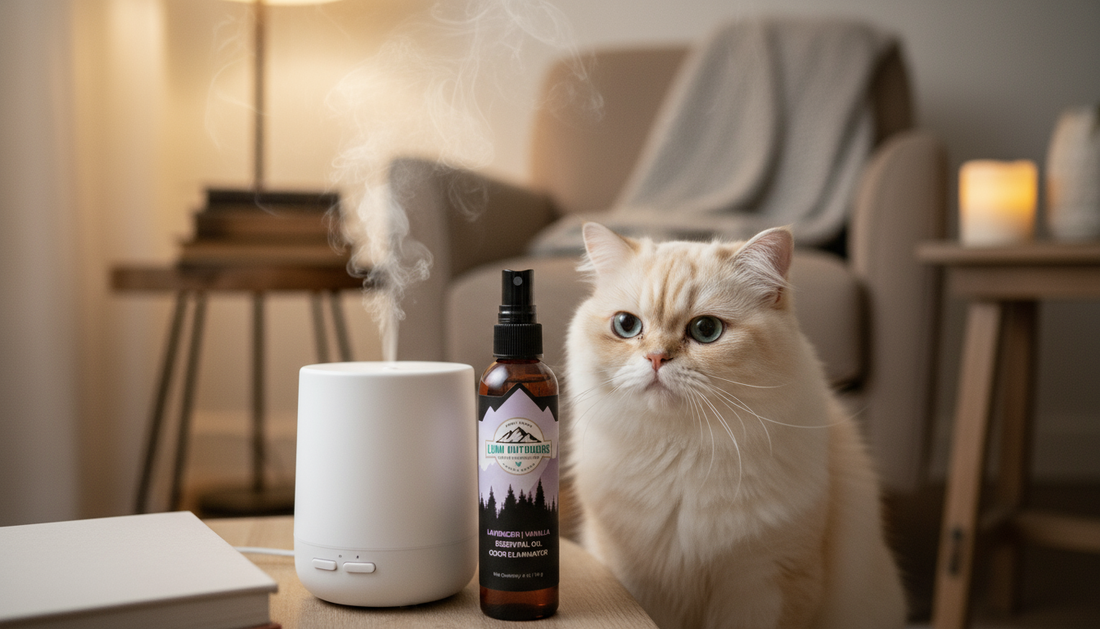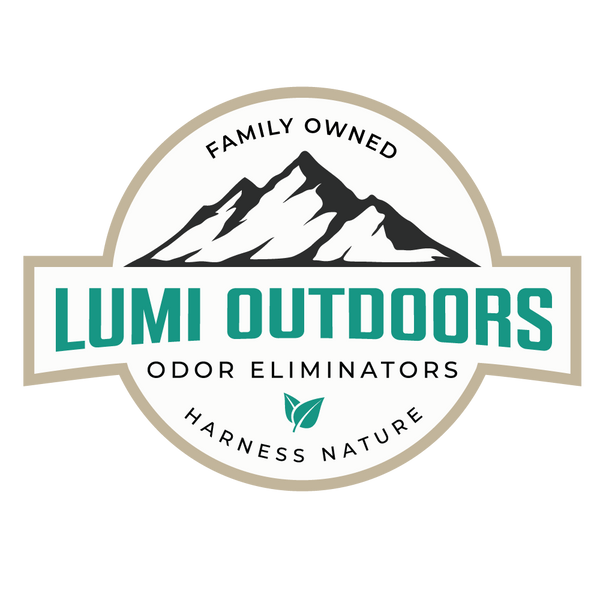
Are Essential Oil Diffusers Safe for Pets? A Pet Owner's Guide
Share
Keeping Your Pet Safe While Scenting Your Home
As pet parents, we want the best for our furry companions. And let's be honest, we also want our homes to smell lovely, especially with the occasional pet odor lingering. Essential oil diffusers have soared in popularity as a 'natural' way to achieve this, but it brings up a really important question: are essential oil diffusers safe for pets? This isn't a simple yes or no, and diving a little deeper can help you make informed choices that keep everyone in your household happy and healthy.
Key Takeaways
- Many essential oils can be toxic to pets, especially cats and small animals.
- Even diffused oils can pose risks through inhalation, skin contact, or ingestion.
- Ventilation is crucial if you choose to diffuse, and always give pets an escape route.
- Safe, natural alternatives like essential oil room sprays exist for truly pet-friendly freshness.
Understanding the Risks: Essential Oils and Your Beloved Pets
It's easy to assume that 'natural' equals 'safe,' but that's not always the case, especially when it comes to essential oils and animals. Our pets process substances very differently than we do, and what might be harmless (or even beneficial) for humans can be quite dangerous for them.

What It Is
Essential oils are highly concentrated plant extracts. When diffused, these tiny oil particles are dispersed into the air, where they can be inhaled, settle on surfaces, or come into direct contact with your pet's skin.
What It Means For You
- ✅ Inhalation Concerns: Pets, particularly cats with their sensitive respiratory systems, can inhale these particles directly into their lungs. This can cause respiratory irritation or even more severe issues.
- ✅ Skin and Fur Contamination: Diffused oils can settle on your pet's fur. Cats are meticulously clean, and when they groom themselves, they can easily ingest these oils. Dogs might lie on a surface where oils have settled and then lick their paws.
- ✅ Limited Liver Metabolism: Cats, in particular, lack a specific enzyme in their liver that dogs and humans have. This enzyme is crucial for metabolizing certain compounds found in many essential oils. Without it, toxins can build up in their system, leading to serious illness or even liver damage.
- ✅ Small Size, Big Impact: Smaller pets, like birds or hamsters, have much smaller body masses, meaning even a tiny amount of exposure can have a disproportionately large and often devastating effect.
Commonly Harmful Essential Oils for Pets
While many essential oils can be problematic, some are particularly notorious for being toxic to pets. It's smart to be aware of these.
What It Is
Certain essential oils contain compounds that are especially difficult or impossible for pet livers (especially feline livers) to process. These include phenols and other constituents.
What It Means For You
- ✅ Oils to ❌ AVOID ❌ with Pets:
- Tea Tree Oil (Melaleuca): Highly toxic to both cats and dogs, even in small amounts.
- Peppermint Oil: Can cause respiratory issues and liver damage.
- Citrus Oils (Lemon, Orange, Bergamot, Grapefruit): Photosensitive and can cause gastrointestinal upset or more severe issues.
- Pine & Fir Oils: Irritating to respiratory systems and can cause liver damage.
- Eucalyptus Oil: Can cause respiratory distress and neurological symptoms.
- Wintergreen Oil: Contains methyl salicylate (like aspirin) and can be very dangerous.
- Cinnamon Oil: Irritant, can cause skin and mucous membrane issues.
- Clove Oil: Can cause liver damage and other serious problems.
- ✅ Even 'Pet-Safe' Claims Can Be Misleading: Be wary of products marketed as 'pet-safe' essential oil blends. Without knowing the exact concentration and specific oils, it's hard to verify their safety. When in doubt, it's always best to err on the side of caution.
- ✅ Symptoms to Watch For: If you diffuse and notice your pet exhibiting symptoms like excessive drooling, lethargy, vomiting, tremors, difficulty breathing, or skin irritation, seek immediate veterinary attention.
Safe Alternatives for a Fresh, Pet-Friendly Home
So, if diffusers are a no-go, how can you keep your home smelling lovely without risking your pet's health? Thankfully, there are fantastic, genuinely pet-safe options out there!

What It Is
Natural room sprays are a brilliant alternative. Unlike diffusers that continually release airborne particles, a room spray allows you to direct where and when the scent is applied, giving you ultimate control. High-quality sprays use plant-derived ingredients and essential oils in appropriate dilutions, designed to eliminate odors rather than just mask them.
What It Means For You
- ✅ Targeted Odor Elimination: You can spray directly on pet beds, near litter boxes, or in areas where odors tend to linger, without saturating the entire air space your pet breathes.
- ✅ No Continuous Exposure: Pets aren't constantly inhaling diffused particles. The scent dissipates more quickly, reducing continuous exposure risks.
- ✅ Control Over Ingredients: Look for sprays that clearly list their ingredients and explicitly state they are safe for use around pets. Products like Lumi Outdoors Lavender Vanilla Room Spray or Lumi Outdoors Lemon Vanilla Room Spray are formulated specifically with pet safety in mind, using carefully selected essential oils in safe concentrations to neutralize odors.
- ✅ Clean Ingredients: Our natural room sprays are free from synthetic perfumes, parabens, phthalates, and other harsh chemicals that can be harmful to both pets and humans. You can learn more about finding truly safe air fresheners in our article: Best Natural Air Freshener for Your Home: Chemical-Free Scents.
- ✅ Great for Shoe Odors Too: Don't forget about those super smelly shoes! For active families, pet-safe shoe deodorizer sprays like our Natural Citrus Tea Tree Shoe Deodorizer Spray provide an effective, non-toxic way to tackle tough shoe odors.
This product WORKS. My son's sneakers used to stink up our whole mudroom. We were using chemical sprays which only masked the problem but the underlying odor was still there. I wanted a chemical free approach to dealing with the odor and found this product. It eliminates odor and has a very pleasant and natural smell. Problem solved!
The Clear Choice: Safe Home Fragrance vs. Risky Diffusers
When it comes to keeping your home smelling fresh and your pets safe, the choice becomes clear. Let's look at how targeted, natural room sprays stack up against general essential oil diffusion.
| Feature/Benefit | Natural Room Sprays (e.g., Lumi Outdoors) | Essential Oil Diffusers |
|---|---|---|
| Pet Safety Profile | ✅ Explicitly formulated for pet-friendly homes; controlled application. | ❌ Many essential oils are toxic; continuous, widespread exposure means high risk. |
| Odor Elimination | ✅ Actively neutralizes odor molecules; doesn't just mask smells. | 🟡 Masks odors with fragrance; not true elimination. |
| Control & Flexibility | ✅ Spot treatment; instant freshness where needed; no continuous release. | ❌ Continuous release; fills entire air space; hard to control exposure. |
| Ingredient Transparency | ✅ Full ingredient lists, often plant-based and chemical-free. | 🟡 Can be unclear about 100% pure essential oil source or if synthetic blends. |
The Takeaway: For a genuinely fresh home that prioritizes your pet's well-being, natural room sprays are the smarter, safer investment. They offer targeted odor elimination and peace of mind, something continuous diffusers simply can't guarantee when pets are involved.
Excellent product. I thoight I killed my columbia bugaboo 2 winterboots. I had walked through the wading pool on the commons in Boston. They were rancid the last two months. Within seconds the natural oils dominated the foul odor AND took over the first floor of my house. Great fresh natural smell. Will buy again soon just for a back-up. Many uses for this spray.
Frequently Asked Questions
Can I ever use a diffuser if I have pets?
This is a tricky one. While some vets might say 'maybe, with extreme caution,' most pet safety experts advise against it entirely. The main issue is that even if you use 'safe' essential oils, the continuous airborne particles can still irritate a pet's sensitive respiratory system. If you absolutely must, consider diffusing in a separate, well-ventilated room that your pet cannot access, and never leave it running for extended periods. Most importantly, ensure your pet always has a clear escape route to an area free of diffused oils.
What should I do if I suspect my pet has been exposed to essential oils?
If you notice any unusual symptoms in your pet—vomiting, lethargy, drooling, tremors, or difficulty breathing—after using essential oils or a diffuser, contact your veterinarian immediately. It's helpful to know which essential oil was used and its concentration if possible. Time is often critical in these situations.
Are beeswax candles or natural incense safer than diffusers for pets?
While beeswax candles and natural incense might seem like better options, they still release particulate matter and smoke into the air, which can be irritating or harmful to a pet's respiratory system, especially for birds or animals with pre-existing conditions like asthma. They also carry fire risks. When considering air freshening options, the less particulate matter in the air, the better for your pets. This is why targeted room sprays are often recommended.
What about using essential oils topically on my pets to help with fleas or anxiety?
Absolutely not! Applying essential oils directly to your pet's skin is highly dangerous and can lead to severe poisoning. Many oils are readily absorbed through the skin, and pets can easily lick them off, leading to ingestion. Always consult your veterinarian before using any remedies, especially natural ones, directly on your pet. There are much safer, veterinarian-approved alternatives for flea control and anxiety management.
Ultimately, prioritizing your pet's health means being mindful of what you introduce into their environment. While the allure of a beautifully scented home is understandable, there are plenty of truly pet-safe ways to achieve it. Opt for products designed with pet safety in mind, like natural odor-eliminating room sprays, and enjoy a fresh home without the worry!
